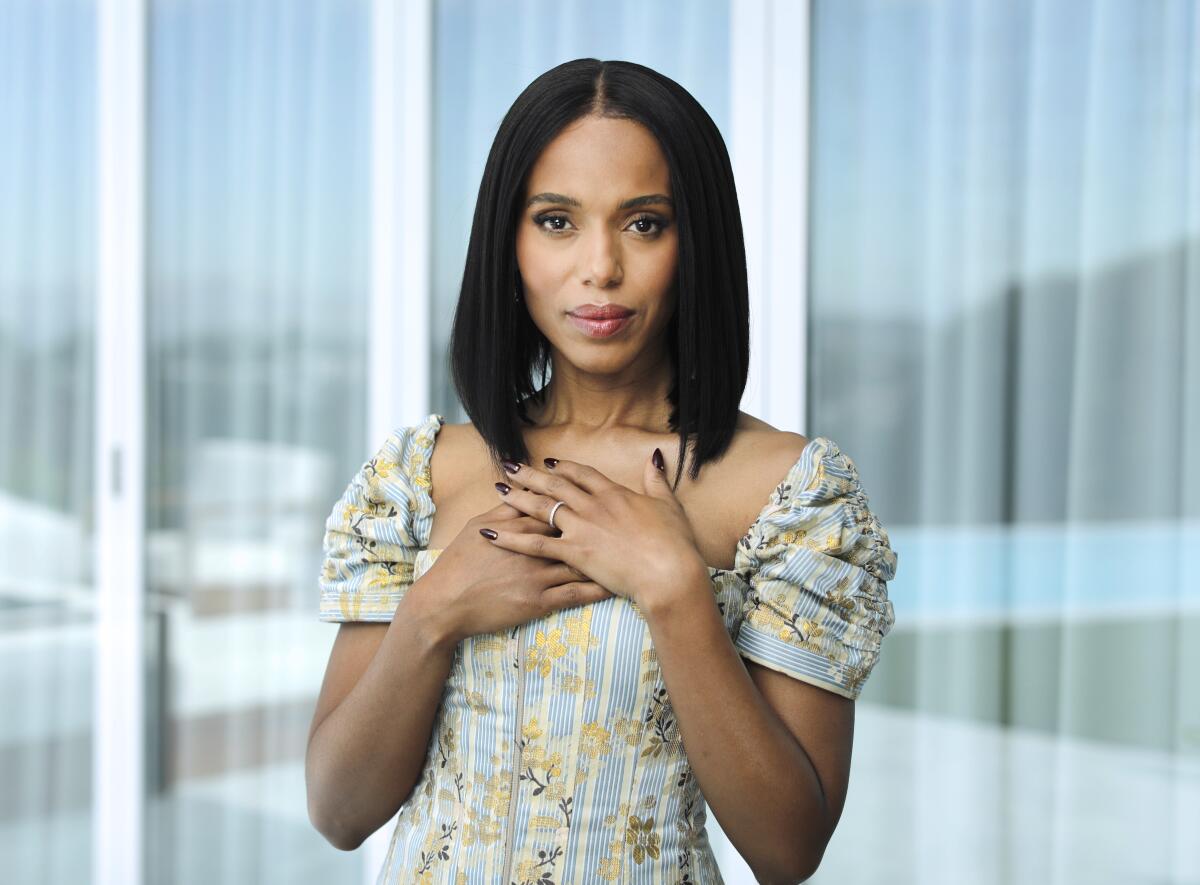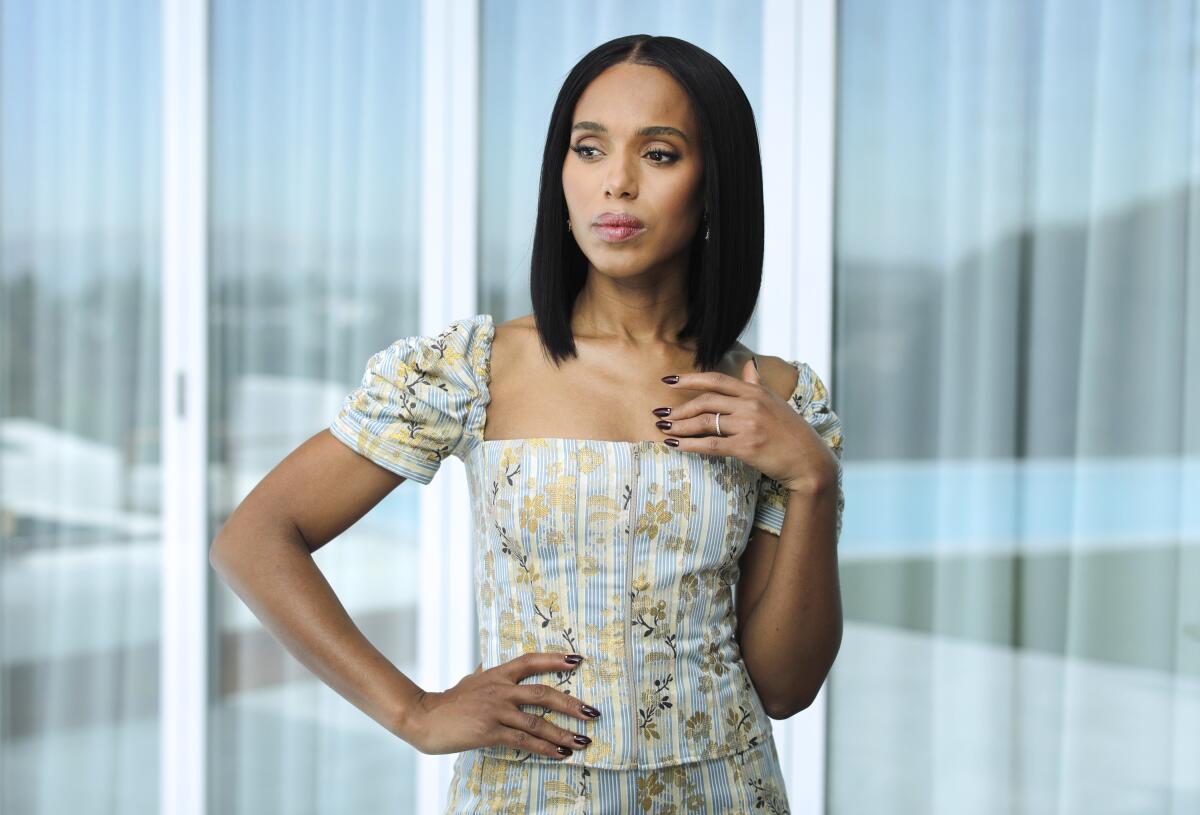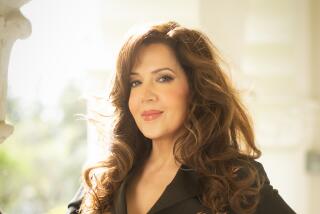Kerry Washington on ‘American Son’ and her post-‘Scandal’ interracial relationships onscreen

After donning designer suits and Prada purses as crisis management expert Olivia Pope for seven years of “Scandal,” Kerry Washington was used to playing the most powerful person in every room she entered.
So when Shonda Rhimes’ groundbreaking ABC series ended last year, Washington found a role as far removed from Pope as she could get, leaving Los Angeles to star in Christopher Demos-Brown’s Broadway play “American Son.” For four months, eight times a week, she played Kendra, who — humbly dressed in sneakers and jeans — spends the entire 90-minute piece trying to access some form of power.
“Washington honors all the shattered loved ones who have gone through Kendra’s experience,” wrote The Times’ critic Charles McNulty of her performance as a woman desperately waiting in the wee hours of the morning at a Miami police station to find out the fate of her teenage son, Jamal. He’s mysteriously MIA after he and some friends had been pulled over by police earlier in the evening.
Kendra’s frantic search for information is made all the more complicated by a young uniform officer (Jeremy Jordan), who adheres uncomfortably to “protocol” while stumbling over questions about whether or not Jamal has a “street name”; Jamal’s white FBI agent father (Steven Pasquale), who walked out on his family not long ago and harbors his own racial hang-ups; and, eventually, the station’s Lieutenant (Eugene Lee), who may have the answers everyone is seeking.
Not all critics felt positively about the play, which was directed by Kenny Leon, specifically its attempts to confront the complex truths of police brutality, microaggressions and unconscious bias.
The debates were sparked in theater circles, but now audiences globally can decide for themselves when a filmed version of the play, directed by Leon and featuring the same four actors from the original production, hits Netflix on Nov. 1. (The streamer is billing it as a “Television Event.”)
Before “American Son” made its world premiere at the Toronto International Film Festival back in September, Washington sat down with The Times to look back on “Scandal’s” “fairy tale of interracial love” and defend “American Son’s” controversial walk into a social justice minefield.
Why go to Broadway after “Scandal?”
That’s the last thing I thought I’d do, because Broadway is hard! But all of the actors that I respect the most come from the theater and return to it. I love the Denzel Washington model of, every three or four years, he goes back and does something amazing that keeps his muscles in shape as an actor. I wanted to make sure I was asking that of myself.
I guess it was also a palate cleanser. This character is everything that Olivia Pope wasn’t, and that also felt like a really good challenge for me to swing the pendulum.
In what way?
Well, in some ways, I spent seven seasons on “Scandal” in kind of a fairy tale of interracial love. This amazing, powerful man loved the ... out of this woman — he literally invented a war to bring her home. An unbelievable, ends-of-the-earth love and understanding, where his racial embrace of her was so flawless that she could call him Thomas Jefferson as a dig. If there was any truth to that, she wouldn’t have said it. It’s like, “How do I make him feel like an ass? I’ll say this ridiculous thing about our relationship.” So that was like the fairy-tale version — the Disney princess, ABC version, literally.
But it can also be really hard, even when you are in a relationship with somebody whom you love so intensely but you’re having a really difficult time crossing that cultural divide and really speaking each other’s language.
Also, Olivia Pope wasn’t a mother.
Yeah, she chose not to be. Looking back, Olivia Pope was like a superhero. She therefore could not have the weakness that’s inherent in motherhood because with motherhood comes vulnerability, that’s part of what defines the role. And so her choice to not be a mother also kept her from that vulnerability. Whereas Kendra is swimming in vulnerability and the powerlessness of motherhood.
And, you know, there’s no Prada bags, no Armani suits; there’s gray sneakers and jeans. Even just wearing my hair natural and in a bun, and with very little makeup, felt very un-Olivia Pope.
How did the similar, real-world situations affect your performances onstage, eight times a week?
I had a wall in my dressing room that was like a prayer memorial, with pictures of Sandra Bland, Philando Castile, Tamir Rice. I had some family members come and see their son’s or brother’s or sister’s picture on the wall. I mean, there were so many pictures, and I kept adding more throughout the run.
Also, I know what it means to have dramatic literature with Philando Castile and Tamir Rice’s names added to the canon, to see those words in Samuel French. To be able to say those sacred names eight times a week in front of audiences and make audiences remember them, and to have some of their family members come and see the play and hear them being honored in that way, was amazing.
The Netflix release isn’t a straightforward recorded performance of a play, but a film in itself. How was that done in so little time?
We shot it in five days, maybe a week or so after we finished the run at the end of January. The designer added some more walls to the Broadway set on sound stages, and everything was shot handheld — very vérité. These Steadicam operators and boom operators were dancing with us in these long takes, 20 minutes at a time. We were lucky because we had six months of rehearsal, but I’ve never had to hold that level of concentration on a set.
It’s great because, once the play opened, I was getting all these messages on social media from people in Brazil, South Africa, the Caribbean, all over Europe — people who were saying, ‘We also have issues with police violence and unconscious bias.’ Globally, this is not a unique experience to Americans. Yeah, we did it eight times a week in a theater that holds about 900 people, but now, millions of people all over the world are gonna have access to this story.
As a viewer, I was surprised by the “twists” of this piece, which were divisive among some Broadway critics. I was somewhat frustrated with the conclusion it proclaims: in this situation, everyone’s a little bit right.
[Laughs] You could say we’re all a little right and we’re all very wrong. But everybody’s culpable for what happens to Jamal because of our mentalities. I feel like Kendra sweeps her blackness under the rug for so long to try to make this marriage work that she isn’t there as a black mother for her black child, and he doesn’t feel seen. His father’s culpable for not seeing his blackness, for pushing this toxic masculinity on him — but you can understand where he’s coming from. I mean, my mother didn’t let my cousins walk around with their pants sagging. And then for Jeremy’s character, it’s “I’m just trying to make sure my own kids have a father tonight, so if I have to shoot you first, so be it.” That naive innocence, it’s not about race.
I don’t mean to make you answer for the playwright, but what would you like to say to anyone who shrugs off this project as giving casual racists a bit too much credence?
For me, when I read it, and in performing it, what I loved was the complexity of it. There are huge, huge problems in law enforcement, but we are all capable of unconscious bias. And I feel like we’re at a place right now where we aren’t able to listen to each other because we all have our news channels that we watched that give us the news the way we want to hear it, and we don’t engage in conversation that makes us uncomfortable. If we’re triggered, we exit. I don’t follow people on Twitter who are gonna say ... that makes me furious, right?
So we live in these isolated bubbles and we don’t really have opportunities to cross over those lines and to share our truth and to really hear each other and be open to places where we might be wrong, where our assumptions may be keeping us from our connections. That’s part of what the play is challenging us to do: question our assumptions, and be willing to be in the complexity.
How so?
It’s like, yes, there is a problem in law enforcement, but it’s not just white cops, right? It’s law enforcement in general. So when a black officer enters that culture, they are vulnerable to those same ideologies. And so being willing to not simplify the issue and tackle the complexities; to say, the system of police in this country was born out of capturing slaves. That means, if you’re a black officer who joins that system, you have to grapple with that or be victim to the problems that are inherent in that role.
Every single person who sat in that audience in that run each felt, at some point, like they heard themselves onstage and then also, at some point, was surprised by their own assumptions and unconscious bias. That feels important to me. Like I could stand onstage and tell you where the white people were sitting and where the black people were sitting based on who was laughing or applauding or weeping at what, and who wasn’t. Everybody has such a different reaction to the play, and I think what’s most important is that it causes us to look at ourselves more closely and ask ourselves what our belief systems are, and how are we perpetuating the problem or not.

You’re also currently filming the Hulu series “Little Fires Everywhere,” which deals with unconscious bias in a different way, right?
Yes! Celeste [Ng, the book’s author] is so genius. For me, when you grow up in New York City, race is not this binary thing, even though the country considers it just black and white. So I love that “Little Fires” is so much about class and race outside of black. Mia isn’t even black [in the book] — Celeste says she imagined her being black, but she’s not written black per se in that specificity. But we have to deal with Asian identity and Asian culture and how we treat immigrants. I’m honestly having the time of my life.
And I love working with Reese [Witherspoon], she is an extraordinary partner, and we’re so grateful to be doing it together. I mean, we’re basically making a show about our teenage selves and our mothers; these characters are in high school when she and I were in high school, and we’re playing our mothers. So we are really unpacking a lot ... about who we are and where we come from and how we were raised and what we believe and how we got there. It’s uncomfortable at times but also exciting and really, really special.
What’s something new that you’ve discovered about your mother or your childhood altogether?
It’s so cliche, but I’m understanding both of my parents more than I would have or did before. I think that always happens in parenting, that you understand how she must have felt at certain times.
Also, even though I became a mother in those seven years [on “Scandal”], I never got to deal with issues of parenting on the show. So now I’m getting to really explore ideas and feelings and beliefs around parenting for myself through this work. It’s really teaching me a lot, and I think it’s really growing me as both a daughter and a mother.
So per the Denzel method, you’ll be back onstage in a few years, then.
Maybe in another three years. His method is like every three or four years. Yeah, yeah. I should try to figure out what he’s doing next and try to get in that.
More to Read
The complete guide to home viewing
Get Screen Gab for everything about the TV shows and streaming movies everyone’s talking about.
You may occasionally receive promotional content from the Los Angeles Times.







